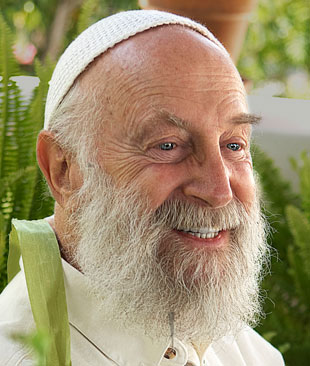Raise the Sparks of Holiness
"Every particle in our physical universe, every structure and every being, is a shell that contains sparks of holiness. Our task . . . is to release each spark from the shell and raise it up, ultimately to return it to its original state. The way these sparks are raised is through acts of lovingkindness, of being in harmony with the universe, and through higher awareness.
"The ramifications of this teaching are enormous. In each moment of existence we have the potential to raise holy sparks. If we are unaware of this ability and are spiritually asleep, then we do not accomplish much, for the medium through which the sparks are raised is consciousness itself.
"Our opportunities to raise sparks are boundless. The choices we make for our activities, the interactions we have with our family, friends, neighbors, business associates, and even strangers, the way we spend our leisure time, the books we read, the television we watch, the way we relate to food, everything in daily life presents sparks locked in husks awaiting release."
— God Is a Verb: Kabbalah and the Practice of Mystical Judaism
The Continuous Flow of Creation
"This idea of the continuous flow of creation completely alters the way we view things. When we have a sense of substance and solidity, we are inclined to have more faith in the past and future. History has an important dimension in our reality, and we base our lives on our own experiences and those of others. The theory of continuous creation, however, leads us to a relationship with life that mystics around the world suggest is the ultimate reality: there is only Now.
"The added dimension in Judaism, of course, is that the Now rests upon the palm of God's hand, so to speak. The dimension of this moment is supported in its entirety by the nature of the Divine. Thus there is a vital relationship between God and every aspect of creation. Each breath I draw is initiated, sustained, and nourished by the power of creation. Each event is permeated by the magic of the Divine Presence."
— God Is a Verb: Kabbalah and the Practice of Mystical Judaism
The Enlightenment Process
"There are at least four essential elements composing the foundation of the enlightenment process: purification, concentration, effort, and mastery. It is helpful for us to evaluate our practice by the criteria of one or more of these essential characteristics.
"In addition, when we understand the purpose of these elements, we gain a fresh appreciation of many different practices and traditions because we are better prepared to see the universality in the process of spiritual inquiry. This deepens our own inner work and helps us to respect others."
— A Heart of Stillness: A Complete Guide to Learning the Art of Meditation
Recognize Teachers Everywhere
"In the end, everyone is our teacher, on one level or another. The child is our teacher, our friends, our family, the stranger on the street. Every experience is a challenge; a teaching is always hidden in it. Every thought that bubbles up in our minds can teach us things about ourselves, if we are able to listen."
— Silence, Simplicity and Solitude: A Complete Guide to Spiritual Retreat
Spiritual Retreat
"A spiritual retreat is medicine for soul starvation. Through silence, solitary practice, and simple living, we begin to fill the empty reservoir. This lifts the veils, dissolves the masks, and creates space within for the feelings of forgiveness, compassion, and loving kindness that are so often blocked.
"The retreat is not an end in itself; it is simply a method to help us slow down and stop. We are like globes attached to a center point by an elastic thread. The faster we spin, the farther we get from the center. When we slow down, we draw into the center. If we are able to stop, we rest exactly at the midpoint.
— Silence, Simplicity and Solitude: A Complete Guide to Spiritual Retreat
God's Smile
"I have begun visualizing myself cradled in God's hands, soothed by God's infinite love. I have also invented a new game for myself, called God's Smile. As my point of concentration, I imagine the presence of God's pleasure; when I am distracted and in my own world, I soon notice the absence of this transcendental smile and quickly sharpen my point of concentration until it has returned. This has been extraordinarily effective."
— Three Gates to Meditation Practice: A Personal Journey into Sufism, Buddhism, and Judaism
Peace of Mind
"Peace of mind does not result from the attempt to control our lives. In fact, it is just the opposite. It comes from the wisdom that is illuminated when we learn how to relax in a way that allows us to 'be with what is.' In our practice, we learn how to engage in something when it is appropriate and how to disengage as well. Peace of mind comes from recognizing how one fits into the scheme of things, the degree to which all life is interconnected, and the realization that nobody is ever alone."
— Ecstatic Kabbalah
